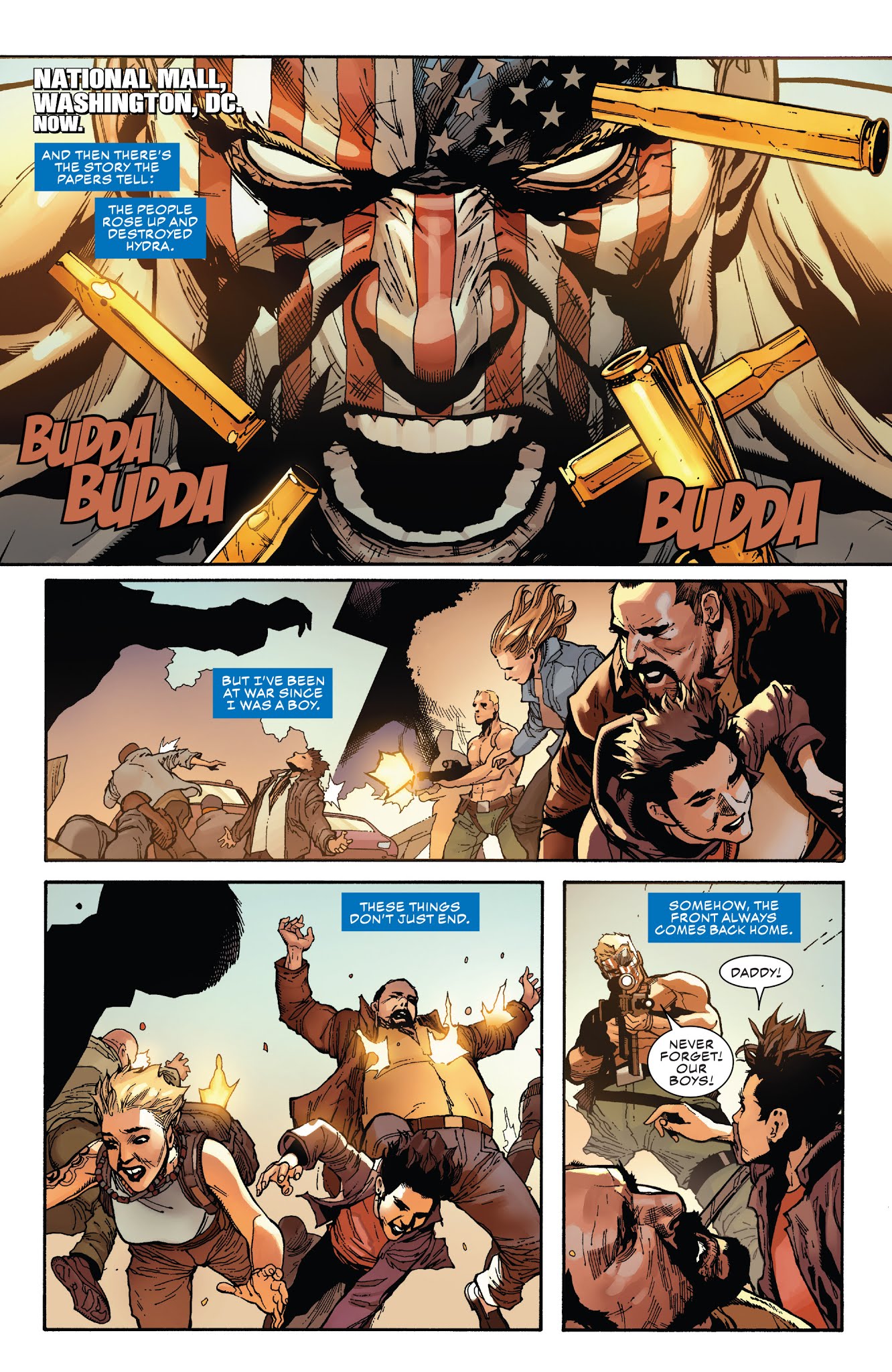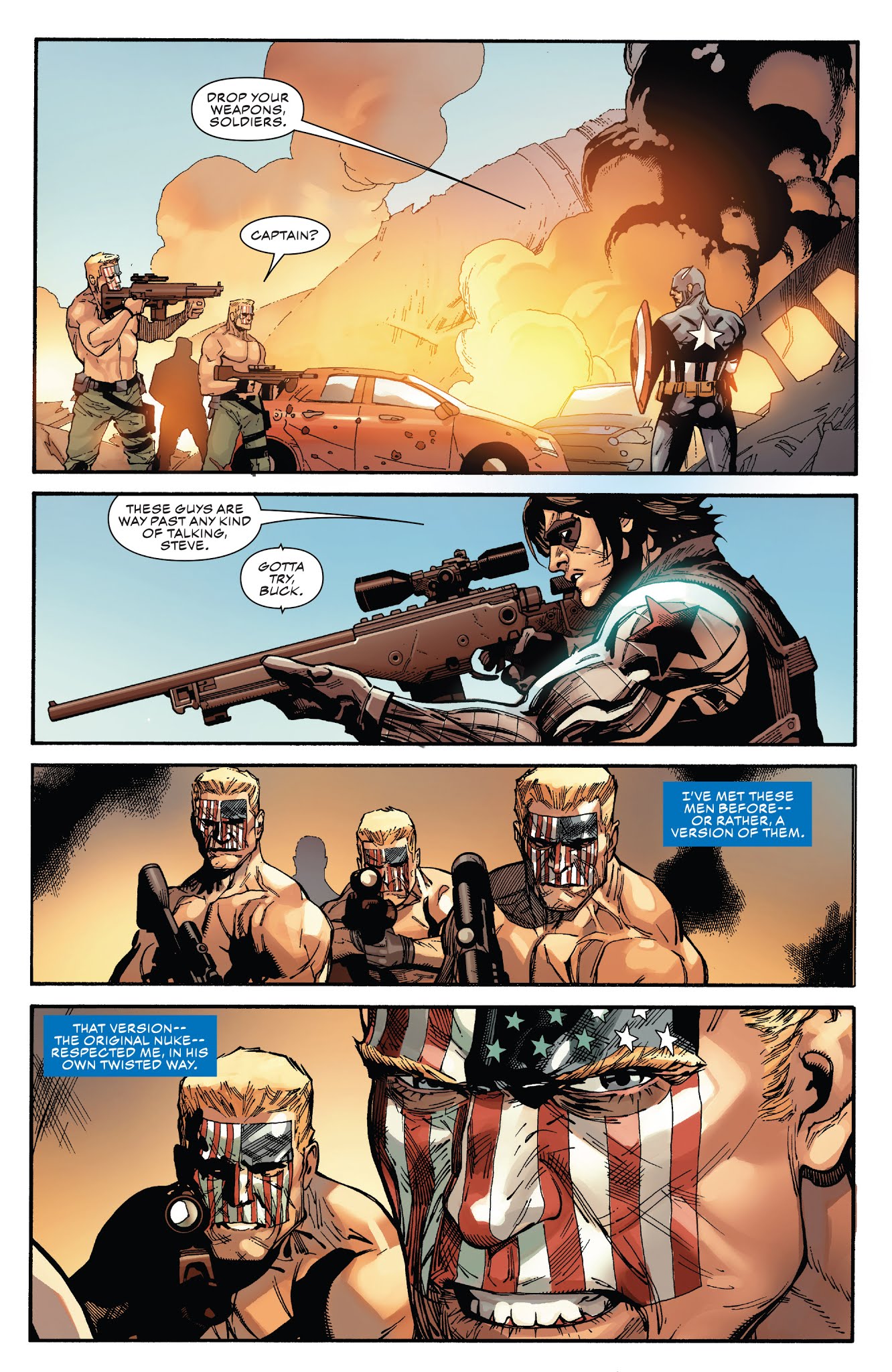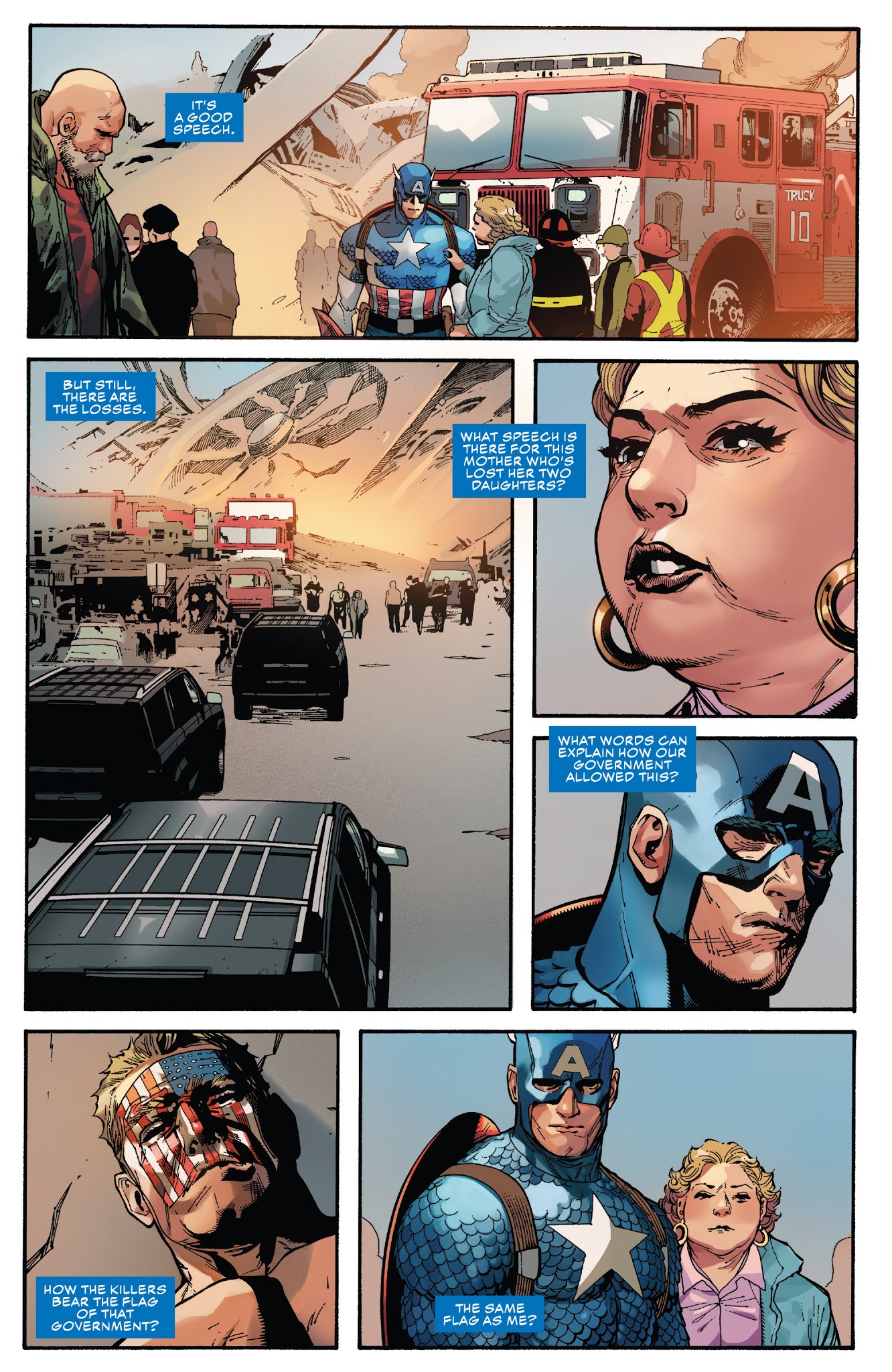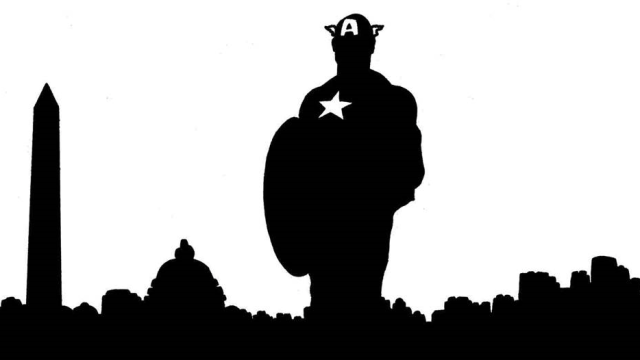Captain America is not just a superhero or the Avengers’ on-again, off-again leader. He’s a symbol, both in Marvel’s comics and here in the real world, for all of the potential the US has to be an agent of justice and change in the larger world.
We recently spoke with writer Ta-Nehisi Coates about the politics (or lack thereof) in his new run and how he’s approaching the famous character.
That concept — that America is a just, righteous place in which opportunity is afforded to all — is something that Coats centres in his work on Captain America, but it’s also something that gives all-American hero Steve Rogers pause.
In the wake of Secret Empire, Steve (understandably) is a man who doesn’t truly know himself, because he’s the symbol of a country that willingly gave itself over to Hydra at the behest of someone who, more or less, was the exact same person as him.
It’s impossible to read Coates’ Captain America without a distinct sense that it’s a deep rumination on the current state of American politics, but when I spoke with him recently, he explained that his Cap isn’t really a mouthpiece for his own personal politics.
We’re able to see ourselves and the American Dream in Captain America, Coates explained, but the book is about so much more than what readers are likely expecting.
This interview has been edited for clarity.
As broad as a question as this is to start with, it’s kind of necessary. Who is Steve Rogers, exactly, at the beginning of this story?
Ta-Nehisi Coates: Steve Rogers is like… if I had to summarise, he’s loyal to nothing but the dream, you know? The idea of a guy who embodies the ideals of a country that often doesn’t live up to those ideals.
Some of the greatest Captain America stories find him in conflict with the very country he represents. Go back to the first Secret Empire story. Up to that moment in Born Again that deals with the government-sponsored Nuke program.
There’s this constant tension between how Cap sees America and the ideals it represents. You know, whether the politicians who run the country are living up to those ideals themselves. Those are the really, really strong themes I wanted to revisit.
Let’s talk about that tension for a second. There’s a conflict within Steve’s inner monologue that’s present throughout the issue. What are the concepts that he’s trying to grapple with?
Coates: Well, you know what’s interesting? The reaction to Secret Empire was very interesting to me. I think a lot of the reaction had to do with the politics of the time and people felt a certain way because they were looking for something in Captain America book that wasn’t necessarily there.
But in fact, that arc’s whole notion of somebody co-opting Cap’s identity in some sort of way or using what Captain America represents to inflict evil upon the world — it’s not that new.
Going back to the Red Skull.
Coates: Right? At one point, he actually had Captain America’s body. The Nuke program itself was an extension of the Super-Soldier program. Then Ed Brubaker brings back the Grand Director, the US Agent…
You have all of these various iterations of people who’re taking up the mantle in ways that they’re able to hide their immorality or unscrupulousness.
Cap’s really trying to reconcile with that. He’s conflicted because he has to ask himself what responsibility he has in all of this, and he’s not sure if there’s something about him and that costume that makes all of that evil masquerading as good possible in the first place.

So he’s definitely thinking about what went down in Secret Empire.
Coates: One way of looking at Secret Empire is to see how, through sheer will and might, Hydra was able to take over the world. Cap? He doesn’t quite believe that. And part of why is because he has quite a bit of experience with tyranny and despotism and he knows that despots don’t just rule through sheer force, there’s always something they’re tapping into — some sort of need that people feel.
Afterwards, society tells itself “no, no, no, it was just that this person held everybody hostage and made us do things”, but usually, they’re addressing something. Hitler comes, not totally, but partially, from this shame in Germany that people could place on somebody after the country lost World War I.
Tyrants, bigots, despots, they appeal to something in people — in society, it’s always true. What Steve is really struggling with is trying to figure out that “what about us?” narrative, you know? He and everybody else is asking what about the country made them to vulnerable to Hydra in that moment.
If he had one, what… well, what’s Steve’s endgame? What’s his ultimate goal?
Coates: He’s trying to save his country. He’s always trying to save his country. He believes his country can be better.
There’s an interesting way in which you use his “out-of-timeness” to make a point about the cyclical nature of the rises and falls of fascist powers. Given Steve’s experiences, what does he make of the world that he finds himself in and ultimately, is he really trying to “save” it?
Coates: Yes, very much so. Very, very much so.
That, to me, was the beauty of writing the book, if I can just step outside for a second. I obviously have my own political views about the country, but the beauty of having the opportunity to write Captain America is to live in someone else’s head. Steve’s an idealist, man.
I’ve said this before and I think that people assume that it’s some sort of praise or statement about a character, but when I think about Steve I think about Barack Obama. I don’t mean Barack Obama’s politics and I’m not talking about Obama as an inspirational figure, I’m thinking about the optimism.
Steve has that kind of “arc of history bends towards justice” mentality. He believes that, ultimately, America’s true and that the dream can be real. He believes that, very much so.

Do you think that Steve’s optimism, like Obama’s, comes hand in hand with a kind of detrimental naïveté, though?
Coates: [laughs] I mean. How do I put this? No. Not as the writer of Captain America, I don’t think that. I can’t write this book as Ta-Nehisi the essayist. I don’t think that would make for a very good Captain America. I have to accept Steve Rogers.
It’s like acting; I try to write as an actor. I’m not really in the interpretive place where I ask how true the things Steve believes really are.
That’s the place of the essayist or the critic, but as a writer, I have to believe this dude.
It’s the same way that I have to believe T’Challa, you know? I have my own thoughts about kings and queens, but I have to believe that T’Challa believes in Wakanda and the importance of royalty even as he struggles with it. I have to accept that in order to convincingly write the character.
It’s very, very easy to take a character and just filter your own thoughts through them, but that’s not what I wanna do. The challenge is to be on that Cate Blanchett shit — to transform into somebody else.
To me, that’s the mark of a great writer. Someone who can really convincingly inhabit the world that a person exists in with all of the difficulties and complexities that come with being that person.
Let’s take it back to Secret Empire. Does Steve feel guilt about what was done in his name? How’s he coming to grips with that?
Coates: That’s really all through the book. It was Steve who did this, you know what I’m saying? It might not have been Steve-Steve, but it was Steve Rogers. He had his face. It’s not just Secret Empire Steve Rogers that did this.
Repeatedly, people have used aspects of his identity to justify their evil — and one of the questions he really has to ask himself is how much of that is in him and whether he’s responsible for any of that.
The Nuke clones’ rallying cries about “our boys” have a very particular kind of weight to them in the context of our current political climate. What is it that they’re fighting for and, aside from the villains, what is it that fuels their beliefs? What do they want?
Coates: I don’t want to give away too much, but it’s not even about the plot. I’m hesitant to answer that because I don’t want to get in the way of people’s interpretations.
Let me just say it like this. One of the things that, I don’t want to say bothers me, but is dispiriting… I think sometimes about comic book fandom is the need to know exactly what’s going on. There’s an unwillingness to be open to people having different interpretations.
And maybe this extends beyond comic book fandom because there are all of these arguments about canon and what’s real and what isn’t.
I want to think that there are things I’ve put in there about where the Nukes come from and who they are that leave a lot of room to think about what they mean.

Should people read into the subtext, then?
Coates: I’m not trying to be coy; it’s not like there’s some kind of major plot point I’m trying to hide here. I just really worry about trying to tell people how to feel about things.
I know what I was thinking and I can safely say that. One of the things that Secret Empire Steve Rogers plays on is people’s faith in Captain America. You have all of these quote unquote “heroes” who, because they follow Steve Rogers, they do things that are sort of unspeakable.
One of the fascinating things about Nuke is that he’s always had respect for Captain America. Originally, he really respected the hell out of Captain America, and I was thinking about what it would mean for people like that who respected Cap to be manipulated into doing something evil and then realise what they did was wrong.
Or even people who maybe really who saw a symbol that they so respected being co-opted into doing something evil and what kind of trauma that might cause.
As basic a question as this it, it needs to be asked. What does a symbol like Captain America mean exactly in 2018?
Coates: …It’s the dream. That same dream that’s deeply inherent in most Americans, that we can transcend all of our difficulties and sordid history and truly live lives in pursuit of happiness. We think we can accomplish that without hurting other people and without governmental surveillance and overcome our pasts to really be pure. That’s what, I think, Cap evokes in folks.
Again, I’m talking to you as a writer. That’s what I’m trying to get at because you really have to put on a different hat when you do this kind of stuff. You can’t come at this like an Atlantic national correspondent.
Like, I have no problem saying this, but there was an article that came out recently about how this book isn’t what people are expecting [from me] because it’s not really about my politics or about race. There’s this expectation that I’m going to paint the shield red, black and green in issue #3 and that Cap’s going to demand reparations and go to Harlem and somebody’s going to be like, “Get out of here, whitey!”
But that’s just not what this is. This is a different job. But that’s not why I took this on. You don’t take on Captain America or any comic book, really, with the expectation that somehow the audience for the message you’re sending is going to stick or grow.
You’ve gotta love the character. You’ve gotta love comic books — the form. It’s got to come out of that.

Comments